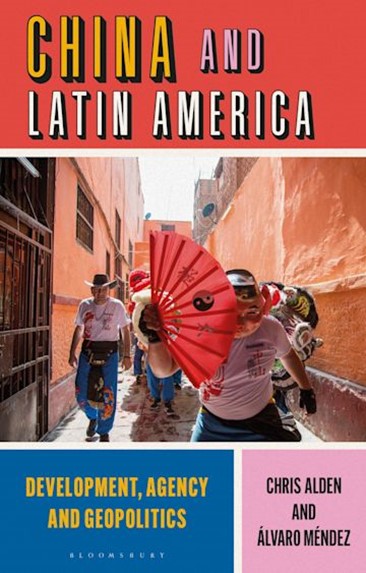Book Review - China and Latin America: Development, Agency, and Geopolitics

China and Latin America: Development, Agency, and Geopolitics by Chris Alden and Alvaro Mendez. London: Bloomsbury 2023. 281 pp., £70 hardcover 9781786992536, £22.99 paperback 9781786992529, £20.69 e-book
One of the main untold tales of the 21st century is of China’s emergence as a crucial geopolitical and economic player in Latin America. China and Latin America fills this gap by comprehensively examining China’s multifaceted engagement in the region. The authors explore, in a very accessible, analytically sound, and informative monograph, how Beijing sought to expand its influence and ties with Latin American countries and sub-regions, from Mexico to Argentina and Brazil, through Central America and the Caribbean. From infrastructure, trade and investment to political and diplomatic engagement, the book offers a sharp assessment of the challenges and opportunities Beijing’s growing presence presents to the region. The picture that emerges in the book is one of complexity, diversity, and nuance, which might even challenge the very notion of Latin America as a coherent geopolitical and socio-economic space.
 Beyond its focus on the rather neglected topic of China’s role in Latin America, there are a number of interesting points about this book. Firstly, it is cleverly organised through the conceptual lenses of development, agency, and geopolitics. This allows for an approach which expertly and systematically addresses the complexity of China’s presence in Latin America through a clear set of analytical frames, offering clarity to readers, who might be less familiar with the region’s socio-economic and political contexts, and cultural/ideological diversity. Secondly, the analysis draws on an impressive and wide-ranging archive of scholarly sources, first-hand data, and the authors’ own deep-rooted expertise on the topic. Thirdly, the book’s close focus on the element of ‘agency’ allows for an interesting and balanced examination of not only China’s role in the region, but also the policy autonomy of Latin American states while engaging with Beijing. Finally, the book invites the reader to understand the current transformations in the region in the wake of China’s global rise, not as an unprecedented historical event, but as tied to a long history which has, from the outset, fundamentally shaped the region.
Beyond its focus on the rather neglected topic of China’s role in Latin America, there are a number of interesting points about this book. Firstly, it is cleverly organised through the conceptual lenses of development, agency, and geopolitics. This allows for an approach which expertly and systematically addresses the complexity of China’s presence in Latin America through a clear set of analytical frames, offering clarity to readers, who might be less familiar with the region’s socio-economic and political contexts, and cultural/ideological diversity. Secondly, the analysis draws on an impressive and wide-ranging archive of scholarly sources, first-hand data, and the authors’ own deep-rooted expertise on the topic. Thirdly, the book’s close focus on the element of ‘agency’ allows for an interesting and balanced examination of not only China’s role in the region, but also the policy autonomy of Latin American states while engaging with Beijing. Finally, the book invites the reader to understand the current transformations in the region in the wake of China’s global rise, not as an unprecedented historical event, but as tied to a long history which has, from the outset, fundamentally shaped the region.
This later point relates to the first two chapters of the book, following the introduction, where the authors compellingly trace the historical trajectory of China’s relationship with Latin America, from the early roots of the triangular trade with the European colonialists over precious metals in the 15th century to the Cold War and beyond. The historical chapters set the stage to what seems to be one of the central contentions of the book: that is, unlike most contemporary accounts of China’s global clout as a novel phenomenon, the Latin American case demonstrates elements of historical continuity, whereby China’s global centrality and the outcomes of uneven combination and coexistence have been central, albeit omitted, dimensions of how the region has been transformed over the centuries.
This is followed by a bloc of five chapters that form the core of the book, where the authors judicially probe specific cases of China’s involvement in Latin America. In chapter three, the authors examine the cases of Chile, Peru, and Argentina. The key ‘take home’ of the chapter is the element of divergence between the types of political regime, and the economic, and ideological outlooks of these Latin American countries and how they have set distinctive strategies to leverage their interests vis-à-vis China. Chapters four and five review the ‘Bolivarian’ experiences in Venezuela, Ecuador, and Bolivia and the rise of right-wing populism in Bolsonaro’s Brazil, respectively. Those two chapters highlight another central development in the region in terms of how China navigates its strategic interests and relationships with Latin American countries, following the emergence of populist regimes, which are tinted by strong ideological colours, both in the left and right of the political spectrum. In chapter six and seven, Alden and Mendez unpack the cases of Mexico and the countries of Central America and the Caribbean, respectively. Given their geographical proximity and concomitant levels of economic dependency with the US, these two chapters most clearly demonstrate how competition between the established regional hegemon, the US, and the strategic interests of the aspiring one, China, are creating difficult choices for national governments in terms of exploiting the benefits of deepening ties with Beijing, while, at the same time, maintaining their economic positions towards Washington. The final chapter further explores the fascinating topic of US/China relations, against the backdrop of Washington’s traditional, and, arguably, declining role as the regional dominant power, and the resulting economic and geostrategic competition for primacy in Latin America.
As the region’s new economic powerhouse and increasingly influential diplomatic player, China's engagement in Latin America has not yet generated the necessary amount of systematic analysis on how Beijing’s influence is impacting on the region’s policy autonomy, economic development, and long-term geopolitical dynamics. While filling those gaps, Chris Alden and Alvaro Mendez have produced an indispensable book, which meticulously unpacks the myriad intricacies, resulting from the encounter between China’s economic and political aspirations with the national and regional contexts of Latin American countries. At the same time, it is somehow puzzling the authors’ silence on the environmental consequences of China’s involvement in Latin America. As one of the central challenges for developing countries worldwide, cooperation on sustainable infrastructure development, anti-deforestation efforts and renewable energy transition are areas that could have featured more prominently in the book. Latin America is one of the most biodiverse regions of the world and central to global efforts to address the current climate crisis. Environmental sustainability will undoubtedly be an unavoidable element of China-Latin America relations in the coming decades.
China and Latin America might be of interest to a broad audience of readers. It addresses topical trends and provides practical, incisive, and clear insights into crucial policy issues that would strongly appeal to a readership of policy makers, economic, media and political analysists, third sector professionals, and the general public, with an interest in the political, economic, and social challenges emerging from China’s deepening involvement in Latin America. Whilst it offers an accessible and mostly jargon-free writing style, which would likely favour a non-scholarly readership, it would also resonate with academics given the book’s thoughtful analysis and original contribution to a still understudied and timely subject.
Marco Vieira is Associate Professor in International Relations at the Department of Political Science and International Studies, University of Birmingham.


